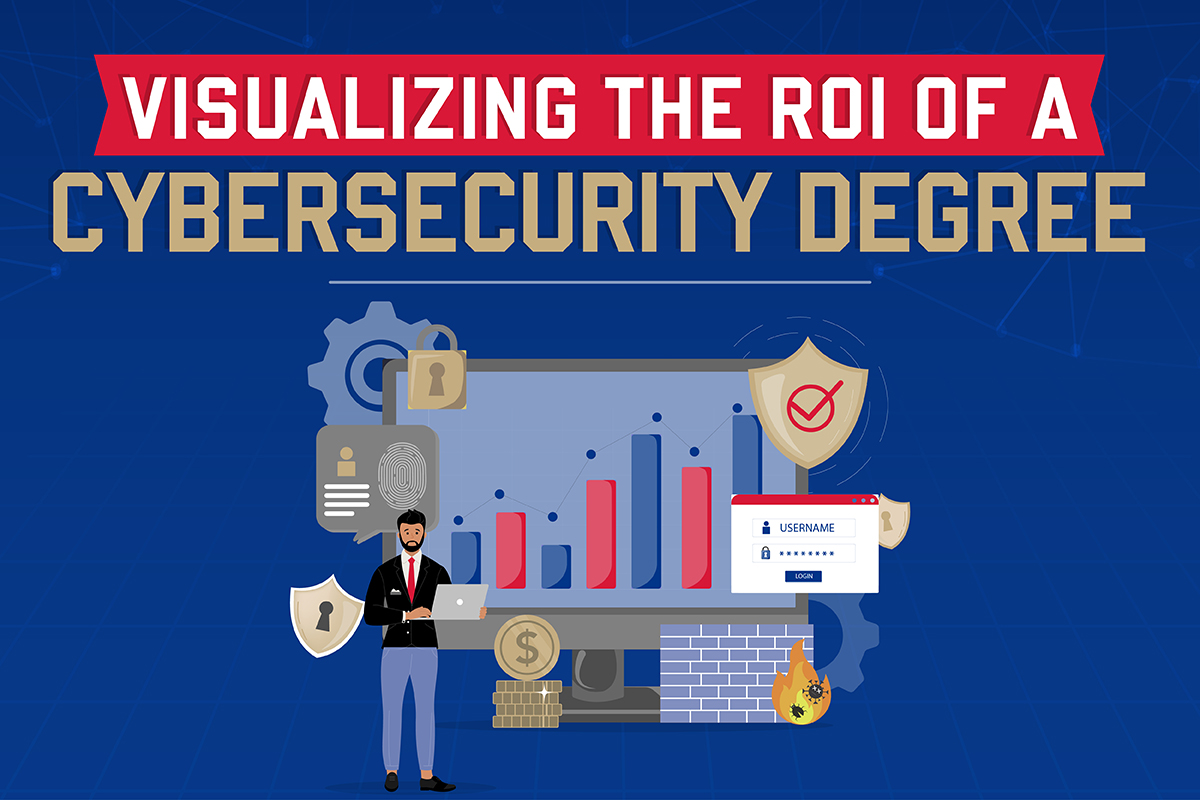Cybersecurity Tips for Small Businesses
Written by:
University of Tulsa
• Jan 15, 2025

Cybersecurity threats are on the rise. In 2023, there were 3,205 known cases of data compromise in the U.S. alone, affecting over 353 million people, according to Statista. The number of cases between 2022 and 2023 skyrocketed, with more than 1,400 more cases happening in 2023 compared to the previous year.
A cybersecurity breach can hurt an organization’s reputation, with 56% of consumers saying they lose all trust in a company after a data breach, according to Civic Science. However, the good news is that demonstrating strong cybersecurity measures can help a company become more trustworthy, with 60% of people saying that they would pay more to patronize a business that they know has strong data protection measures in place.
These cybersecurity tips for small businesses can help a growing company maintain its customers’ trust. To go the extra mile in ensuring that a business is trustworthy, a small business owner may consider pursuing a Master of Science (M.S.) in Cyber Security, allowing them to learn how to stay ahead of cyber attacks firsthand.
Why Is Cybersecurity Important for Small Businesses?
We often hear about the most notable cyber attacks, such as the 2024 hacking of AT&T that led to data being compromised for 73 million current and former customers. However, 41% of small businesses fell victim to a cyber attack, but those rarely receive as much coverage as attacks on multinational companies.
The average data breach cost for small businesses with less than 500 employees is $2.98 million, with the average cost of each breached record being $164, according to a report by IBM and the Ponemon Institute. A successful cyber attack can result in lost trust, but it can also result in direct lost costs, enough to potentially put a small business out of business.
6 Cybersecurity Tips for Small Businesses to Keep Themselves and Customers Safe
These cybersecurity tips for small businesses can help companies keep up customer trust and prevent stolen data and funds.
Keep Security Software Up to Date
Out-of-date security software leaves businesses open to cyber attacks. Small business owners should ensure that their employees are regularly checking to make sure that they’re running the most up-to-date version of their security software.
Set Up Firewall Security
A firewall is a set of programs that essentially blocks unwanted users from accessing data on a private network. Companies should install firewall software on their internet connection and make sure it’s properly enabled at all times.
Plan for Protection on Multiple Devices and Locations
It’s essential for companies to plan for protection, particularly if they have workers who work at home and in the office. Set up a work-from-home safety checklist for employees to follow, including the use of virtual private networks (VPN) and multi-factor authentication.
Control Access on User Accounts
Not every employee needs access to every piece of information, and leaving that door open to all employees can inadvertently also leave the door open to hackers and attack vectors. Restrict data access to only those who need it.
Have a Data Governance Plan
As a part of a company’s cybersecurity risk management plan, small businesses should also create a data governance plan. Data governance is the management of data focused on the quality, security, and availability of a company’s data. While a small business owner may initially have to check the quality, safety, and access of data themselves, they may consider hiring a data steward to go through the processes of checking the integrity of the data.
Train Employees on Security Protocols
When hiring any new employee, cybersecurity protocols should be part of the onboarding process. A small business owner may consider taking this training further. For instance, if a small business owner wants to hire a data steward, they may even sponsor further cybersecurity training, such as a degree in cybersecurity.
Preparing for a More Secure Small Business
Cyber attacks can have severe impacts on all businesses, but small businesses are particularly vulnerable. As a small business strives to grow, the last problem that it needs is a cyber attack, which can result in lost trust and funds. Small businesses may not be able to recover in the same way that a larger business might.
Following the cybersecurity tips for small businesses can help, but business owners can ensure that they’re fully prepared for cyber threats by pursuing further education on the many facets of cybersecurity. The University of Tulsa’s Online Master of Science (M.S.) in Cyber Security allows students to gain the skills they need to thrive in cyber defense today and tomorrow in as little as 20 months.
Find out how to safeguard business data at The University of Tulsa.
Recommended Readings
How to Become an Ethical Hacker
Malware Analyst Career Overview
11 IT Security Tools for Cyber Professionals
Sources:
Center for Strategic & International Studies, Significant Cyber Incidents
CivicScience, “Here’s How Recent Cybersecurity Lapses Are Impacting Consumer Trust and Behavior”


